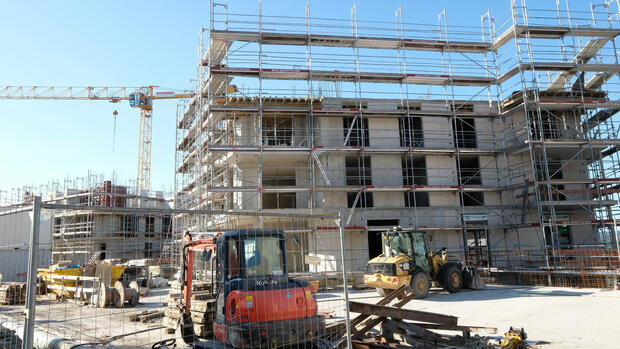According to Klaus Wohlrabe, head of surveys at the Ifo Institute, there is currently great uncertainty in the housing construction market.
(Photo: dpa)
Munich Record wave of cancellations, increasing lack of orders, growing risk of bankruptcy: the crisis in German housing construction triggered by rising credit and material costs is coming to a head. In August, 20.7 percent of companies reported canceled projects, after 18.9 percent in the previous month, as the Munich Ifo Institute announced on Tuesday in its company survey.
“Cancellations in residential construction are piling up to a new high,” said the head of the Ifo surveys, Klaus Wohlrabe. “We have not observed anything comparable since the survey began in 1991. The uncertainty in the market is huge.”
As a result of the rapidly increasing construction costs and the significantly higher interest rates, many projects that were still profitable at the beginning of 2022 are currently no longer feasible.
>>> Read also: Where property buyers in the metropolitan areas save money
“The reduction in funding due to the stricter energy saving requirements is also putting a strain on the builders’ calculations,” added Wohlrabe. As a result, construction companies increasingly found themselves in difficulties.
Some companies still had well-filled order books. However, 44.2 percent of the companies surveyed are already reporting a lack of orders.
For comparison: a year earlier the proportion was only 13.8 percent. “Some companies are already up to their necks in water,” said Wohlrabe.
Pessimistic outlook for housing construction
Currently, 11.9 percent of housing construction companies are reporting financing difficulties. “This is the highest value in over 30 years,” said Wohlrabe.
The majority of companies fear further declines in business for the next six months: the barometer for business expectations is at minus 60.1 points, an “extraordinarily weak level,” according to the Ifo Institute.
>>> Read also: Will property prices continue to fall?
The Federal Association of Independent Real Estate and Housing Companies (BFW) is calling for countermeasures from the federal government due to the crisis. “The historic high in cancellations and the enormous lack of orders prove that our warnings of the crash are now coming true,” said BFW President Dirk Salewski in Berlin. “This economic fever curve will continue to rise. If action is not taken soon, patient housing will be dead.”
What is required are lower incidental acquisition costs, clear financing and funding conditions as well as leaner and faster planning and approval procedures.
The construction crisis is one reason why leading institutes have a negative view of the German economy. The Ifo Institute, for example, assumes that gross domestic product will shrink by 0.4 percent this year.
The European Central Bank (ECB) is fighting high inflation with rising interest rates, which does not make investments in construction and other sectors more expensive and thus slows down the economy.
More: What happens after the real estate boom ends
